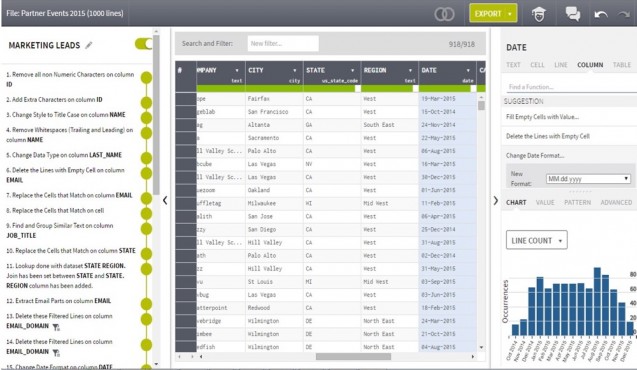Does Anybody Actually Know What ‘Big Data’ Means?

Big data. Say what? Ask anybody in HR or recruiting what big data is, and you’re likely to get a response like, “Hmm … well …”
It’s truly a minefield of a topic among industry insiders. A quick Google search returns “Big data is a term for data sets that are so large or complex that traditional data processing applications are inadequate,” courtesy of Wikipedia. Okay. Seems simple enough, right? No. That definitionway oversimplifies the subject.
In an effort to get a clearer sense of the term, we turned to the folks over at Talend, a software vendor specializing in big data integration.
“I could probably define it a thousand different ways,” says Ciaran Dynes, vice president of products. “But, as soon as we define what big data is, people will say, ‘Well, that’s not big data.'”
See what I mean? How elusive you are, Big D.
That said, Dynes was able to narrow things down a bit. For Talend, big data tends to encompass database technologies (Hadoop, NoSql, Spark, etc.) and the cases those platforms are used for.
“We’re talking about pattern analysis,” Dynes says. “And not only that, but efficiency in analysis.”
When you start combining billions and trillions of new data sources, efficiency is a must. When it comes to big data in recruitment, the way recruiters find potential candidates is radically different from what it was ten years ago.
“Before, candidates would send in their CVs and do the interview route,” Dynes says. “Now, the best candidates aren’t doing the searching themselves anymore. We have to seek them out using all the various social sites.”
Naturally, this creates mountains of profiling data to sift through.
In order to manage the increasing amount of data, Talend has developed a free data preparation app. Those familiar with data analytics and visualization platforms like Excel can see the benefit of a more streamlined prep tool. What was once a job for IT has filtered over into the business-user sphere, creating a disconnect in information between the two parties: data gaps, formatting errors, etc. That, of course, leads to inefficiencies in the hiring process.

Talend’s data preparation app in action
“There’s always been this need to figure out the best way of solving that issue,” Dynes says. “And the business-user today is arguably more tech savvy than ever before – far more willing to do things for themselves.”
Talend’s data prep app was created with that in mind, in an effort to give agency to the business-user and lighten IT’s ever-increasing workload.
So, How Does This Relate to Recruitment Again?
It all goes back to what kind of tools recruiters are using to connect with people. If you’re researching candidates on LinkedIn and you want to see how many people they’re connected with or the likelihood they’re going to be interested in a job opportunity – and you want to merge that information with data from other social media sites – then, oftentimes, the data formats are going to be incompatible.
“What we’re giving you is a platform that combines all the candidate data and allows you to fix the incompatibilities before it’s connected to your analytics tool,” Dynes says.
One of the biggest difficulties facing any company today – whether in recruitment, PR, or tech – is having an IT team that is stretched way too thin with projects. Your IT department can’t always deal with the data issues that people on the business side are often faced with. Talend’s app and other big data integration platforms give analytics tools to the business user, which gives them free access to all the data and allows them to solve the issues on their own. There’s always going to be a gap between the data the IT team delivers and what your visualization tools can do, but that’s where data preparation comes in handy.
Ultimately, big data integration is another method of increasing efficiency in the workplace. Are there a thousand definitions of big data? Yes. Does anybody agree on any of them? Who knows.
But, big data is helping recruiters solve problems more quickly and find the best candidates in the endless sea of social media profiles. In a world that prizes speed, efficiency, and pouncing on talent before the competition can, these tools truly matter.

